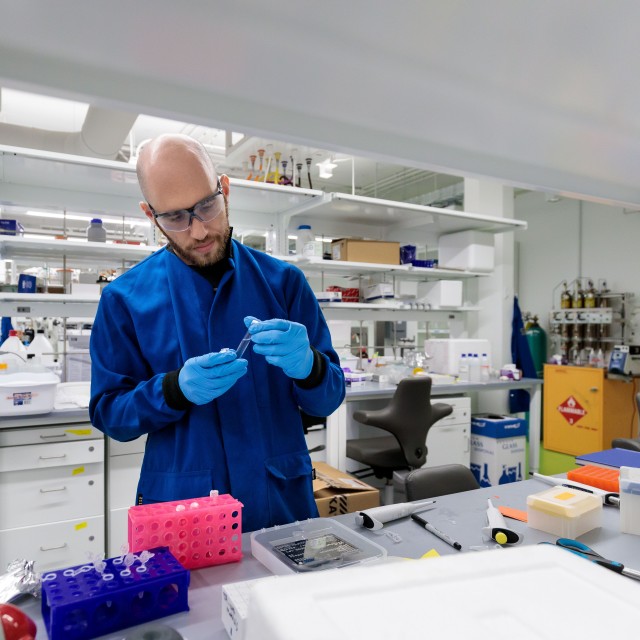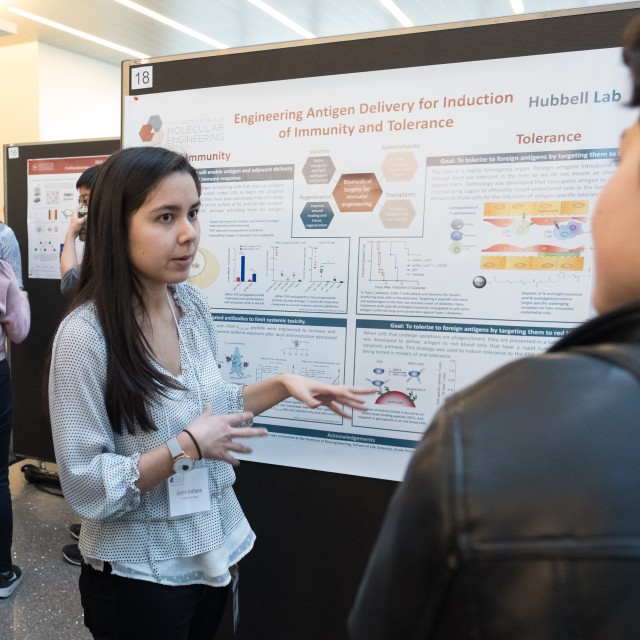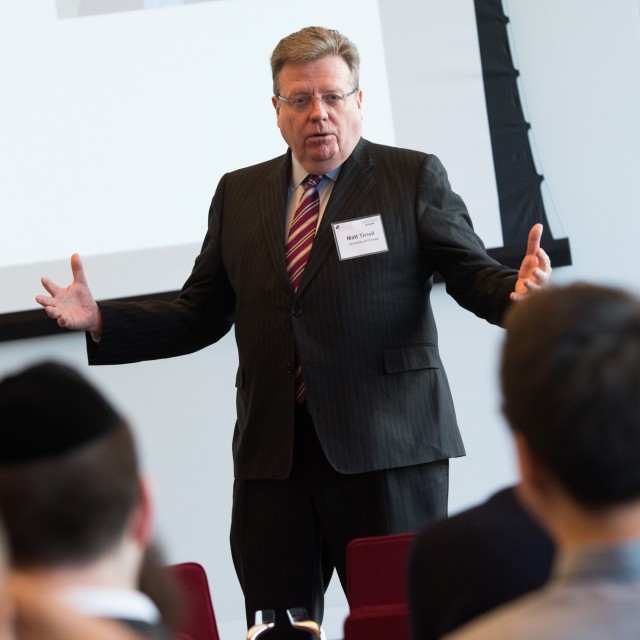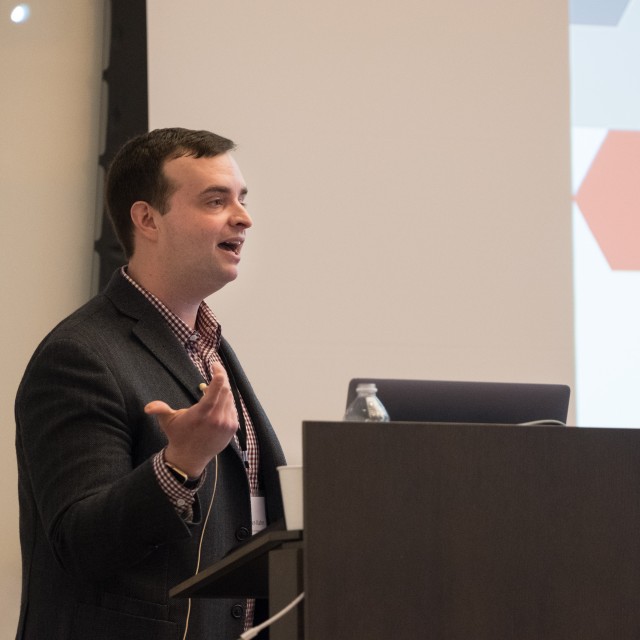*There are 53 postdoctoral training ‘slots’ available to the whole UChicago community across 10 research themes, but ongoing research projects in CIIC laboratories qualify for 8 of these programs (see below), accounting for 45 of 53 slots. This includes the Immunoengineering Postdoctoral Training (ImEPosT) Program.

Working With Us
Postdoctoral Researchers
With our research as a foundation, postdoctoral training with the CIIC empowers the next generation of thought leaders. After you have identified a mentor, fund your training through generous support from the NIAID (T32-AI153020) through the Immunoengineering Postdoctoral Training (ImEPosT) Program, which supplements your research training with professional development in grantwriting and science communications - crucial for tomorrow's PIs. An extensive portfolio of experiential learning options across campus, such as via the Polsky Center, allow you to broaden that training into tech transfer and entrepreneurship, among many possibilities!
Quick Links
By the Numbers
-
2.9
Postdocs per PI
-
$437,024
average research money per PI
-
53
Institutional Fellowship Slots*

Postdoctoral Appointments
Postdoctoral researchers at UChicago are appointed as either Postdoctoral Scholars or Postdoctoral Fellows. Scholars are generally 12-month appointments via a faculty sponsor (through research funding), who will develop a mentoring plan with the appointee with clear expectations and goals. Fellows are appointed through training grants (see below) or external fellowships, with program/funding agency-defined training plans and outcomes.
Quick Links
Research Training Grants
These programs fund stipends and training-related activities for promising postdocs who intend to continue in research-intensive careers. With the exception of the Chicago Fellows Program, most of the following are restricted to US citizens and permanent residents.
The ImEPosT Program seeks to train a new generation of interdisciplinary scientists in the emerging field of immunoengineering, by taking advantage of the strengths of our investigators in identifying the most pressing questions in immunology and combining that with a growing body of bioengineers who create new tools, technologies, and algorithms to push the technical boundaries to address those questions. Anchored by a collegial and cohesive body of 36 mentors across the Pritzker School of Molecular Engineering (PME) and the Biological Sciences Division (BSD), The ImEPosT program will select the most promising postdoctoral trainees from bioengineering and immunology backgrounds to participate on a two-year program of collaborative research across the immunology-bioengineering interface that includes a flexible didactic component to build important skills like project development and management, grant writing, teaching, science communication, outreach, and career planning.
Led by Profs. Melody A. Swartz and Maria-Luisa Alegre, the ImEPosT program will build on an outstanding infrastructure for postdoctoral training at UChicago together with a history of success of its faculty in mentoring prior trainees into successful careers in academia, government, and industry to create a new program that addresses emerging engineering needs in the rapidly evolving fields of immunopathology and immunotherapy.
Medical Oncology is a subspecialty of internal medicine that concerns itself with the diagnosis, staging, and treatment of malignant diseases. The emphasis is on the use of systemic therapies that include chemotherapy and biologics. Fundamental research includes cancer genetics, cancer cytogenetics, molecular oncology, and cancer pharmacology. The purpose of this program is to provide training to board-certified or board-eligible internists who desire to become the physician-scientists of the future and who want to maintain a full-time academic focus.
The program emphasizes training in vascular biology, atherosclerosis, cardiac development, cellular electrophysiology, cellular metabolism, cell signaling, gene regulation, and genetic disease.
The program supports new doctorate holders (within 3 years) interested in pursuing postdoctoral training with eligible UChicago faculty members. The expectation is that Chicago Fellows will go on to be the next generation of scientific leaders in their fields. The program funds the fellow’s stipend for two years, plus an additional $10,000/year for independent research activities.
Offered by the Committee on Clinical Pharmacology and Pharmacogenomics, this training program provides an education in a broad range of academic clinical pharmacology activities through exposure to both research and clinical activities and studies. Most fellows will have a M.D. degree, will have completed their residency training, and will be eligible for board certification in their selected specialty. However, qualified applicants with a Ph.D. and Pharm.D. in a relevant discipline will be considered for acceptance into the program.
Offered by the Department of Medicine’s Section on Endocrinology, Diabetes, & Metabolism, this program focuses on MD and MD/PhD trainees with interests in the study of hormonal regulation. Regularly scheduled conferences and research seminars are part of the training program, and the trainees have the opportunity to interact with invited speakers and also to attend national meetings and to present the results of their research in this forum.
Administered through the Institute for Translational Medicine, which is a partnership between major Chicago-area research universities and health providers, this program gives postdoctoral students research training in clinical and translational science, as well as access to special workshops and avenues to present their research. In the new program, trainees can select one of two training pathways based on their research interests and training needs: the Clinical Research Pathway or the Medical Informatics Pathway.
This multidisciplinary program takes in physicians, PhD students, and postdoctoral researchers and trains them to become independent, productive investigators in the fields of adult and pediatric digestive diseases and/or nutrition. The program offers a well-balanced and broad curriculum in a diverse area of fields pertaining to digestive diseases and nutrition. The program also offers its students the opportunity to attend national meetings, workshops and symposia.
Under the direction of Prof. Anne Sperling, this program accepts Ph.D. or M.D. holders, training them in basic cell and molecular biology research aimed at elucidating the pathophysiology of human respiratory disease and critical illness. The program focuses primarily on Airway Biology and on Endothelial Cell Biology. Formal coursework, research presentations, and clinical exposure, coupled with laboratory investigation, provide broad experience designed to facilitate transition to the trainees’ independent research careers.

Responsible Conduct of Research (RCR)
All researchers at UChicago are required to complete training in the responsible conduct of research. For researchers supported through federal training grants, the current NIH policy requires 8 contact hours of RCR training/every 4 years. To fulfill these requirements, a number of programs are available across the UChicago network.
Quick Links

Additional Resources
You aim for bigger and better things after your postdoc. Let us help take you there. The UChicago community has a wide variety of offerings to enhance and round up your training, personal and career development, and your network.